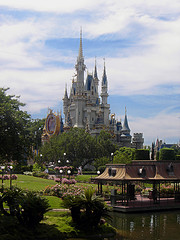 I’m a big Disney fan. I moved from the hustle and bustle of the New York City metropolitan area to live in Central Florida for both better weather and to be able to go to Walt Disney World whenever I want. My family has lived here for 4 years, and we still visit Disney World at least once a week. Until recently, I’ve had just a handful of negative things to say about the Disney theme park experience. With the recession, my perception has changed quite a bit.
I’m a big Disney fan. I moved from the hustle and bustle of the New York City metropolitan area to live in Central Florida for both better weather and to be able to go to Walt Disney World whenever I want. My family has lived here for 4 years, and we still visit Disney World at least once a week. Until recently, I’ve had just a handful of negative things to say about the Disney theme park experience. With the recession, my perception has changed quite a bit.
Let me preface this by saying most people who visit Walt Disney World would never notice the little price increases here and there that Disney has implemented at its theme parks over the past few years, but since I’m there so often, I notice. For example, the price of drinks and snacks sold at the multitude of carts and kiosks around the parks went up first by a quarter and then by another quarter. Next, the food portions at restaurants became noticeably smaller while prices stayed the same or increased. When I moved here in 2005, the price to park each day was $3 less than it is now, and a new array of park ticket packages make the short-term visitors pay a lot more than anyone can truly afford even in the best of economic times. Luckily, I’m a Florida resident so my annual pass is a decent value given how often we visit a Disney theme park (and parking is free), but it kills me to have to pay over $300 for each of my 4-year old triplets’ annual passes.
These are just a couple of examples of the little price hikes that Disney has implemented over the course of the past year or two to make up for attendance losses. At the same time, the company has been discounting hotel rooms and packaging in their dining plan to resort bookings. For example, a current promotion allowed families to stay for 7-nights but only pay for 4. There is no doubt these discounts are working to boost attendance. I have never seen the Disney parks so crowded at all times throughout the year as I have over the past year or so. There simply isn’t a “down time” anymore. I’m constantly amazed by how busy the parks are!
So what does this have to do with corporate branding?
Simple, according to an article in the Orlando Sentinel, Disney is reporting losses despite its aggressive hotel room discounting strategy (although Disney’s losses are considerably less than its competitors such as Universal). Disney’s spokesperson stated in the article that the discounting strategy is meant to expose more people to the Disney brand in the hopes of turning them into repeat customers in the future.
Here is my argument against that strategy:
We all know the 80-20 rule (20% of your customers are responsible for 80% of your sales/profits). Disney’s discounting strategy runs counter to that rule. Rather than trying to rewards its best and most loyal customers, Disney is hurting them by boosting prices on the items those loyal customers buy. Instead, Disney is rewarding the masses who are less likely to become repeat customers. Why are these people unlikely to become repeat Disney World visitors? Simple — the prices for all of the ancillary items people have to purchase are so high that when the hotel price goes up again (and you know they will), the perception for those customers will be that a Disney vacation is simply not in their budgets. The brand loyalty isn’t there, so this audience is unlikely to forego other purchases in order to take a Disney vacation.
Disney is one of the rare yet admired brands that can truly be called a relationship brand that loyal consumers have a strong emotional attachment to. Those loyal customers are the best brand advocates. They’ll defend the brand, spread the word about the brand, and influence others about the brand. Trading a brand’s focus on loyal customers for short term profits from that 80% of customers who are responsible for 20% of sales is a long term strategic error. While most brands try desperately to get the emotional attachment that relationship brands like Disney or Apple have, Disney is forgetting their core audience and doing exactly the opposite. It seems to run counter to fundamental marketing and branding theory, and it will be interesting to see how this strategy fares in the future.
What do you think?
Image: Flickr
Susan Gunelius is the author of 10 marketing, social media, branding, copywriting, and technology books, and she is President & CEO of KeySplash Creative, Inc., a marketing communications company. She also owns Women on Business, an award-wining blog for business women. She is a featured columnist for Entrepreneur.com and Forbes.com, and her marketing-related articles have appeared on websites such as MSNBC.com, BusinessWeek.com, TodayShow.com, and more.
She has over 20 years of experience in the marketing field having spent the first decade of her career directing marketing programs for some of the largest companies in the world, including divisions of AT&T and HSBC. Today, her clients include large and small companies around the world and household brands like Citigroup, Cox Communications, Intuit, and more. Susan is frequently interviewed about marketing and branding by television, radio, print, and online media organizations, and she speaks about these topics at events around the world. You can connect with her on Twitter, Facebook, LinkedIn, or Google+.

I used to be quite the brand advocate for Disney. I spent my honeymoon there, my wife and I would vacation there at least once a year and sometimes twice. We would stay in a Disney resort and dine in the parks and our hotel. My wife’s family had been vacationing at Disney since the parks first opened and I could describe her love of Disney as being almost genetic in nature; while I “fell in love” with Disney.
Unfortunately, as your post describes, some of the magic is being lost in the name of profit. Between the price hikes, my perception of the “big business” greed that has insinuated itself into Disney, the greater focus on attracting conference/business customers than the families for whom Walt Disney created the parks in the first place, etc. I find all of these things to be eroding that love I have for Disney and while I understand they’re a public company and have a responsibility to deliver double-digit growth to their shareholders; that intangible magic is being lost.
I think executives at Disney are going to be sitting around scratching their heads in a few years baffled by shrinking attendance and they won’t realize they had been “slowly killing Tinkerbell” all along.
Susan,
What a great analysis and example!
I’d never even thought of Disney making a tradeoff between the truly loyal local customers and those coming for a one-time vacation… probably because I didn’t realize that people who go to Disney once a week! And if you buy everyone a $3 bottle of water, wow…. that really adds up to profits for them.
It will be interesting to follow this story and to see if, in another few years, you’ll be able to say you saw it coming first. Not that we want Disney to do poorly– more, we want Disney to keep focused on the family, and not excessively on financial gain. For what it’s worth, I don’t think that Disney is or needs to continue to feel more responsible for double-digit growth if that means eroding what they actually are there to provide. Which matters more? Money, or Magic?
Disney is one of the best marketing companies in the world, period. That being said, they aren’t above making mistakes and it seems like the company is ticking off its core in a bid to make more money at least in the short term.
I understand how escalating prices work, but I do hate it when prices go up and portions also drop. When businesses lose focus on serving their customers, then all sorts of troubles ensue. Based on this information, I would say that in a few years Disney will be suffering as customers go elsewhere.
What a great insight! Who would have connected increasing prices of small items to the fact that these are the very things that will irk the loyal customers? Brilliant post.